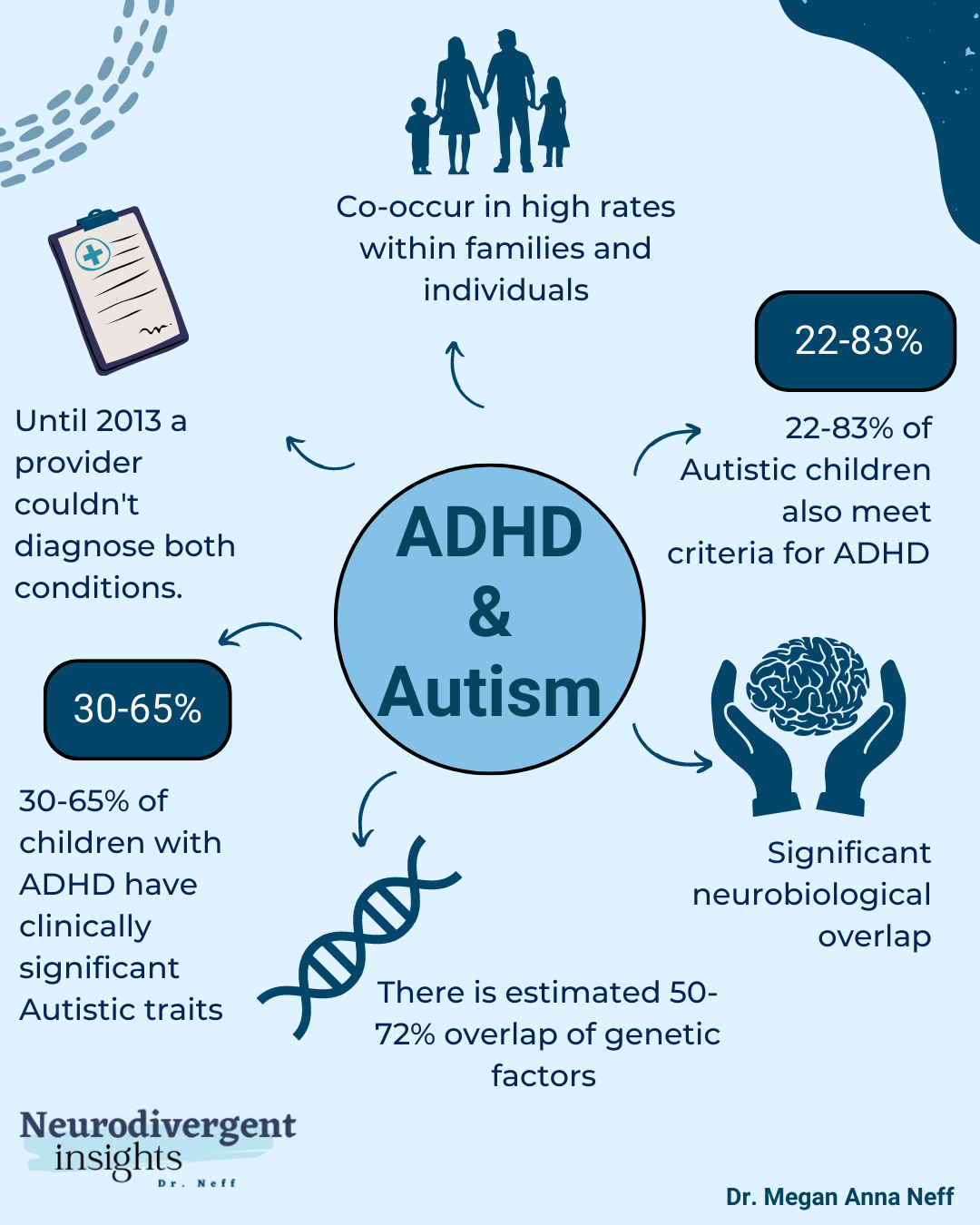- August 31, 2024
Autism and ADHD Overlap

Attention-deficit/hyperactivity disorder (ADHD) and autism spectrum disorder (ASD) are both noted as neurodevelopmental disorders in the DSM-5, however, contemporary perspectives emphasize that they’re just different neurotypes from what is considered neurotypical. Even so, neurodivergence can lead to challenges, though neurodiversity reflects a variety of strengths among humanity.
While approximately 10% of the population has ADHD, some research has shown that 40% of autistic people have ADHD, with other studies suggesting that the rate may be closer to 70%.
Conversely, while 2-3% of people are autistic, 20-50% of those with ADHD are also autistic.
How Are Autism and ADHD Connected?
As the statistics above indicate, people with ADHD are significantly more likely to be autistic compared to those who do not have ADHD, and vice versa.
However, before 2013, the Diagnostic and Statistical Manual of Mental Disorders indicated that an individual could not meet the diagnostic criteria for both diagnoses. Despite this requirement, the comorbidity rate of diagnosing both autism and ADHD was 45% at this time.
ADHD and autism share common characteristics, including inattention, atypical movement (such as fidgeting or stimming behaviors), social difficulties, and differences in learning style. Both autistic people and those with ADHD can experience sensory sensitivities as well.
Despite the overlap, though, current research indicates that ADHD and autism are distinct, separate diagnoses rather than one neurotype on the same spectrum.
Potential Complications
Due to symptom overlap, autistic individuals who also have ADHD might have more difficulty receiving an accurate diagnosis.
Many diagnostic scales emphasize symptoms—more commonly referred to as traits or characteristics—as they tend to manifest when the individual only meets the criteria for autism or ADHD rather than both diagnoses. So a unique combination of symptoms that may not neatly fit into just one diagnostic “box” can be overlooked or misunderstood.
Even though an autistic person is more likely to have ADHD than someone who is not autistic, and someone with ADHD is more likely to be autistic than someone who does not have ADHD, professionals often only assess for one diagnosis at a time.
If you have one diagnosis, it may be beneficial to request testing for the other if you feel that your existing diagnosis does not fully describe your experience.
Sometimes, autistic people with ADHD may have difficulty functioning in a world created for neurotypical brains. Sensory issues and executive dysfunction can make many daily tasks challenging. If you are struggling, look into what support services might be available to you.
Diagnosing AuDHD
ADHD and autism can both be diagnosed by specifically qualified medical and mental health professionals. Although many people have both diagnoses, providers may not evaluate for both unless you request it. A qualified evaluator will use a variety of diagnostic tools when determining if someone meets the diagnostic criteria for ADHD, autism, or both.
Most psychological evaluations for any diagnosis will include a diagnostic interview, during which they will ask several questions about history, symptoms, mental health, and traits that might be consistent with ADHD or autism. Since neurodevelopmental diagnoses like ADHD and autism occur from birth or early childhood, this interview will likely include questions about early developmental years.
If possible, the evaluator may ask to speak to someone who took care of you when you were a baby, but this information (called a collateral interview) is not essential in order to receive a diagnosis.
Support for People with AuDHD
Since the world is not set up for autistic and ADHD brains, many people with either or both diagnoses need support for daily living, work, finances, or other areas. Traditionally, “treatment” for autism and ADHD has emphasized making the person act or appear neurotypical rather than supporting their needs. This has led to increased burnout and trauma symptoms and is increasingly discouraged.
These organizations offer more information on supporting autistic people with ADHD or for finding support regarding your own diagnoses:
- The Autistic Self-Advocacy Network: Created by and for the autistic community, ASAN provides educational information about autism and advocates for autistic-affirming policy changes.
- Neuroclastic: This online non-profit organization elevates autistic voices and stories as well as advocates for a neurodiversity-affirming world.
- CHADD: This organization provides information and community support for people with ADHD and their loved ones.
- ADDitude Mag: This magazine and blog provides medically accurate and community-based information about ADHD.
Keep in Mind
Rather than encouraging autistic people with ADHD to hide their traits, support looks like creating environments where their needs are met without having to hide or mask. Listen to community members, and make decisions about support based on what autistic and ADHD folks say is helpful to them.

